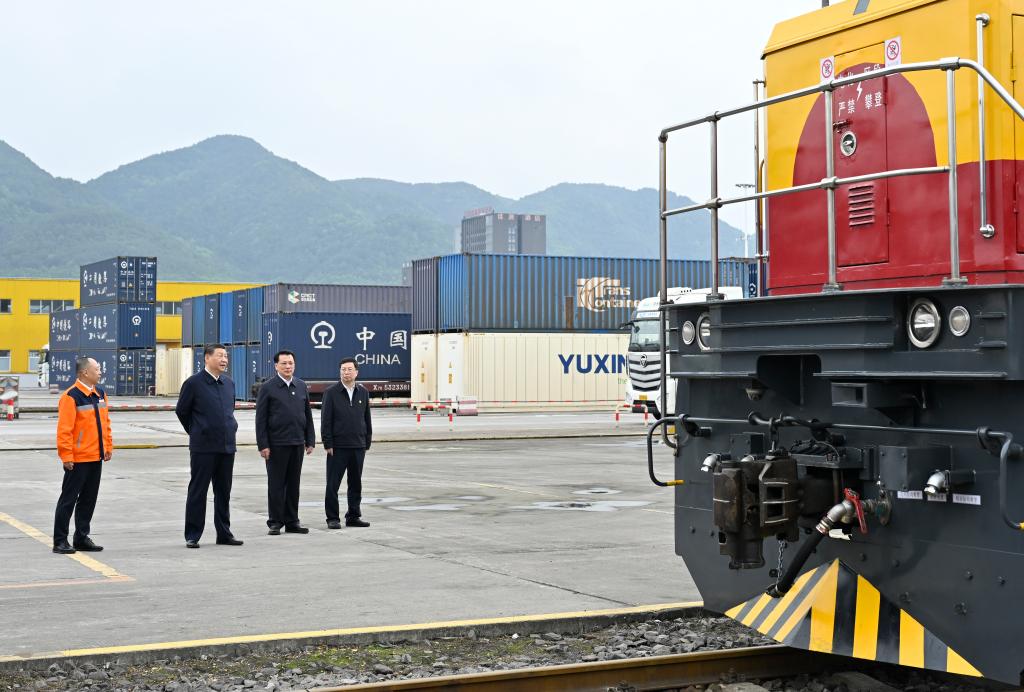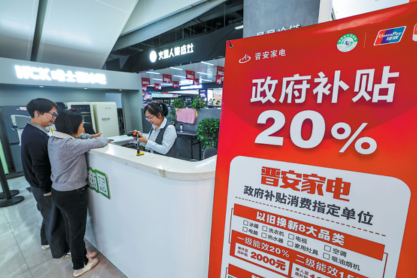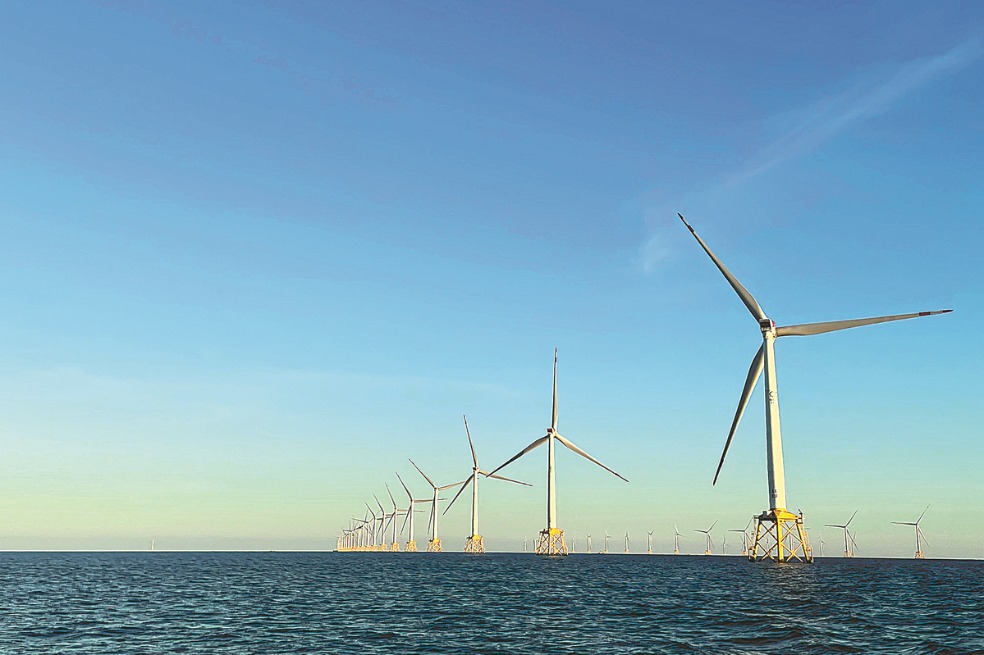Xi calls on Chongqing to write its chapter in Chinese modernization


BEIJING -- Xi Jinping, Chinese president, general secretary of the Communist Party of China (CPC) Central Committee and chairman of the Central Military Commission, called on Chongqing to give full play to its comparative and late-mover advantages in line with the central tasks of the CPC on the new journey in the new era and its mission entrusted by the CPC Central Committee. The city should further reform and opening up across the board, proactively serve and integrate into the new development paradigm, and strive to promote high-quality development. By doing all these, it should try to build itself into a key strategic fulcrum for the development of China's western region in the new era and a comprehensive hub for inland opening up. The city is also urged to make greater achievements in playing its supporting role in the development of the western region, its leading role in promoting the progress of the Belt and Road Initiative, and its exemplary role in stimulating the green development of the Yangtze River Economic Belt, and thereby continuously write its own chapter in advancing Chinese modernization.
From April 22 to 24, accompanied by Yuan Jiajun, a member of the Political Bureau of the CPC Central Committee and the secretary of the CPC Chongqing Municipal Committee, and Hu Henghua, Chongqing's mayor, Xi inspected a logistics park, a community, the city's digital urban operation and governance center and other places.
On the afternoon of April 22, Xi first inspected the Chongqing International Logistics Hub Park. He came to the control center of the dry port of the New International Land-Sea Trade Corridor of the western region, learning about the construction progress of the corridor. Xi stressed that logistics is the lifeline of real economy. The construction of this corridor is of great significance to promoting the formation of an opening-up pattern featuring "building connections with other countries over land and sea while facilitating mutual assistance between eastern and western regions," he said. All related parties should make concerted efforts to do a good job in building and managing this signature project, so as to advance the high-level opening up in the western and inland regions, Xi said. He also urged logistic parks to actively leverage advanced technologies, continue innovating the multimodal transportation and improve scientific management level, so as to play a greater role in building the modern logistic system.
Later on, Xi came to a rail container hub in Chongqing, where he was briefed on situations of cargo distribution, transport routes, operating costs and returns, and chatted with truck drivers, train drivers, loading workers and management staff. He asked about their work load, labor protection, public holiday leaves and salaries. "You work at the frontline of the logistic sector as well as that of the opening up. Through your hard work, many goods are able to traverse the mountains and seas and enter the international markets," Xi said, stressing the importance of their work. He underscored the significance of logistics in promoting the greater openness and development of the western region, and encouraged workers to continue working hard, achieving new progress and making more contributions.
Xi also heard reports on the progress Chongqing made in promoting the development of the Chengdu-Chongqing economic circle and watched an exhibition on Chongqing's achievements of sci-tech innovation and industrial development. He underlined that building the Chengdu-Chongqing economic circle is a major strategic decision made by the CPC Central Committee. Chongqing and Sichuan should work closely, make consistent efforts to expand development capacity, and jointly strive for better results in building the "two cities" in western China in the new era, Xi noted. He highlighted the role of pillar industries as the main battlefield for developing new quality productive forces. Chongqing's manufacturing sector possesses distinct structural characteristics and corresponding advantages, Xi said, adding that Chongqing should firmly focus on technological innovation, leverage its advantages and strengthen weak links. The city should also do its current work well while planning for the future and persist in promoting the high-quality development of the manufacturing industry in a steady manner.
Minzhu village community in Xiejiawan Sub-district, Jiulongpo district, is an old residential area. A renovation project was launched in the community at the beginning of 2022, which has been included in national pilot programs. In the community, Xi learned about the progress of the community renovation and services offered for residents in the community. Xi was briefed on the progress in improving grassroots governance and reducing burden at the grassroots level. He visited the community canteen, where he chatted cordially with people dining there, encouraging the canteen to achieve sustainable development. Xi noted that as a major aspect of the urban renewal, renovation of old residential communities is a project that delivers real benefits to local people. In such renovation, historical structures and unique local characteristics should be preserved while efforts must be made to address practical concerns facing residents. It is important to summarize and promote experience in this regard to deliver more benefits to a larger number of community residents. Xi added that as grassroots Party organizations and communities play a key role in implementing many aspects of work of urban governance, it is necessary to clarify the remit of urban communities, continue to allocate resources down to communities and improve service facilities. Efforts should also be made to strengthen grid-based management and IT support, in a bid to facilitate the level of meticulous community governance and targeted services.
When Xi was leaving, residents of the community gathered to bid farewell to him. Xi told them: "As far as Chinese modernization is concerned, the people's well-being matters the most. All that the Party and government do is for the common people to live a happier life." Xi expressed the hope that Party committees and governments at all levels will invest more financial and material resources in solving problems for people's well-being, and do some practical things to improve people's life every year, so as to continuously enhance people's sense of gain, happiness and security.
On the morning of April 23, Xi visited Chongqing's digital urban operation and governance center, where he was briefed on local efforts to accelerate urban digital transformation and explore new ways for megacity governance, and watched the demonstration of system application. Xi pointed out that the modernization of governance system and capacity is an integral part of Chinese modernization. To strengthen digital empowerment and promote the modernization of urban governance, it is necessary to scientifically plan and build big data platforms and network systems, strengthen joint command and coordination among all parties, and effectively improve execution capacity. Urban governance involves many aspects; the first is to have a strong sense of responsibility to make plans in advance, render management and control accurate and targeted, ensure rapid response, and effectively deal with all kinds of conditions, so as to ensure the safe and orderly operation of the city. Xi hopes them to keep exploring and accumulate new experience.
On the morning of April 24, Xi listened to the report of CPC Chongqing Municipal Committee and Chongqing municipal government on their work, and affirmed what the city has achieved in various aspects of its work.
Xi noted that Chongqing's manufacturing sector has a solid foundation, and its talent resources in science and education is abundant. It is imperative for the city to build a modern industrial system with the advanced manufacturing sector as its backbone. Efforts are required to further promote the major technological transformation and upgrading of the manufacturing sector and the large-scale equipment renewals, speed up transforming and upgrading traditional industries, and foster strategic emerging industries with an advanced global level and competitiveness. It is essential to strengthen efforts to make major technological breakthroughs, integrate innovation in science and technology with that in industries, develop new business forms, models and growth drivers, and develop new quality productive forces according to local conditions. The building of the Chengdu-Chongqing economic circle should be further advanced, and its role as an important growth pole and a new source of power for promoting high-quality development nationwide should be better played. Green development should be further promoted to build a beautiful Chongqing and consolidate the ecological shields along the upper reaches of the Yangtze River.
Xi stressed that Chongqing, with a pioneering and enterprising spirit, should comprehensively deepen reform and expand high-level opening up. It must unswervingly consolidate and develop the public sector and unswervingly encourage, support and guide the development of the non-public sector. On one hand, reform on state-owned enterprises should be deepened, and a batch of state-owned enterprises with strong core competitiveness should be developed. On the other hand, the growth of the private sector should be facilitated, and the vitality of various business entities should be stimulated. Chongqing should proactively integrate itself into the development of a unified national market, take an active part in getting deeply integrated into and serving major national strategies, and play a greater role in promoting the development of the Belt and Road Initiative, the Yangtze River Economic Belt, and the New International Land-Sea Trade Corridor in the western region. Chongqing should also actively dovetail with high-standard international economic and trade rules to develop a first-class market-oriented and law-based international business environment.
Xi noted that Chongqing, as a city with the largest jurisdiction area and population in China, should fully act on the principle that a city should be built by the people and for the people, and actively explore a new path of modernization in megacity governance. It is important for Chongqing to speed up the development of a smart city, build a smart center for city operation and governance, and also establish and improve the "comprehensive and integrated" city governance system and mechanism, so as to make city governance smarter, more efficient and more targeted. It is imperative to guide community-level governance with Party building, adhere to and develop the "Fengqiao Model" in the new era, further cultural and ethical advancement, promote the transformation of outdated rural customs, and make the whole society more civil. It is also a must to promote the building of a resilient city in all aspects and effectively improve its capacity for disaster prevention, mitigation and relief.
Xi stressed that Chongqing should vigorously promote the integrated development of urban and rural areas as it is a megacity with a vast rural and mountainous area, and a reservoir area all in one. Xi called for more efforts to promote new urbanization with focus on county (district) seats, guide and regulate urban industrial and commercial capital, science and technology as well as professionals to serve rural areas in an orderly and law-based manner, so as to promote rural revitalization across the board. More efforts should be made in grain production, and agriculture with ecological characteristics should be developed by making full use of local conditions. It is important to learn from the experience of the Green Rural Revival Program, and promote rural development in light of specific circumstances. Efforts should be focused on important things that can be done with available resources, yield results in a couple of years and meet the urgent needs of villagers. By getting these things done one after another, perceptible and accessible benefits will be made for rural residents. What has been achieved in poverty alleviation should be consolidated and expanded, making sure that no large number of people will slip back into poverty.
Xi pointed out that CPC leadership must be upheld and Party building strengthened. It is imperative to consolidate and expand what has been achieved in the theoretical study program. A long-term mechanism should be established to promote the capability of Party members and officials, especially leading officials, to do political work and improve their competence, so that they will perform their duties in a down-to-earth manner and strive to make contributions. The fight against pointless formalities should be continued to ease burdens on those working at grassroots and create favorable conditions for primary-level officials to do their work well. Solid efforts should be made to carry out study programs on Party disciplines, guiding Party members and officials to truly turn political disciplines and rules into their awareness in political orientation, thinking, and action. Corruption should be consistently fought against and corrupt elements punished, and the breeding grounds and conditions for corruption should be constantly eliminated, in order to keep a clean political environment.
Cai Qi, a member of the Standing Committee of the Political Bureau of the CPC Central Committee and director of the General Office of the CPC Central Committee, accompanied Xi on the inspection tour.
Li Ganjie, He Lifeng and leading officials of relevant central Party and government departments were also on the inspection tour.
Today's Top News
- Chinese, Iranian FMs hold talks in Beijing
- China takes countermeasures against US military companies
- China to see stable growth in coming years
- Winter economy to heat up further on policy support
- Strict observance of Party discipline, rules stressed
- Xi welcomes launch of key rail project






























